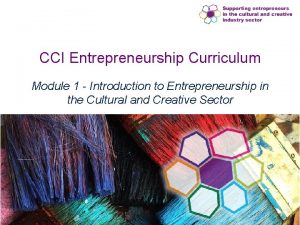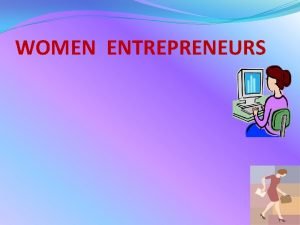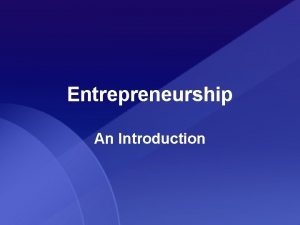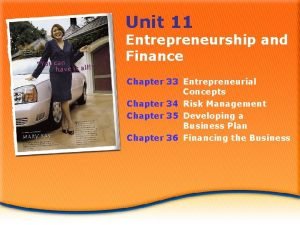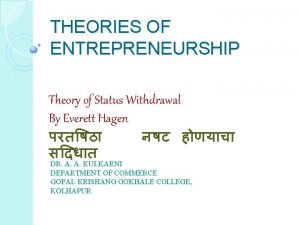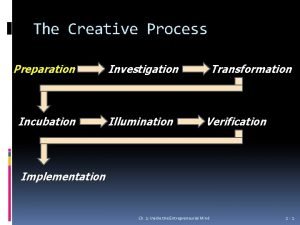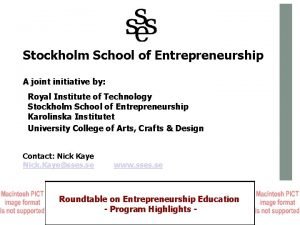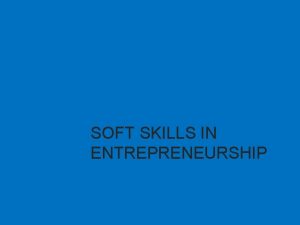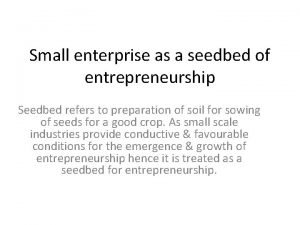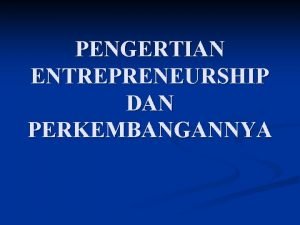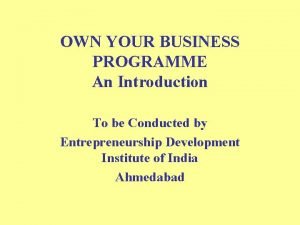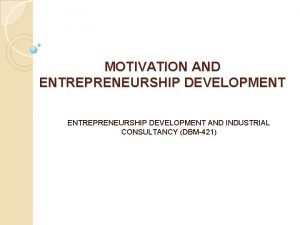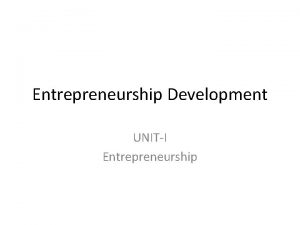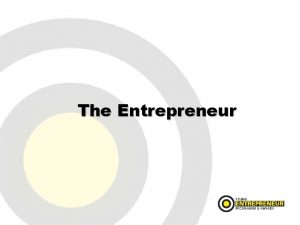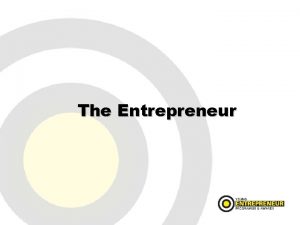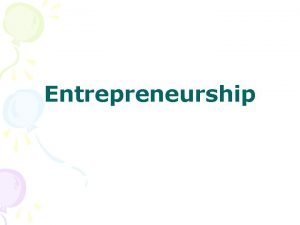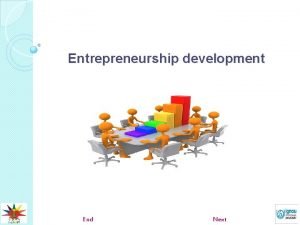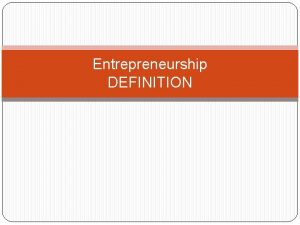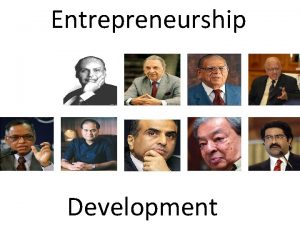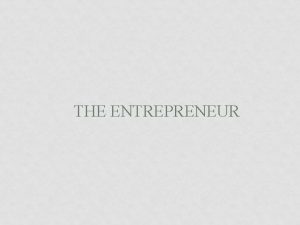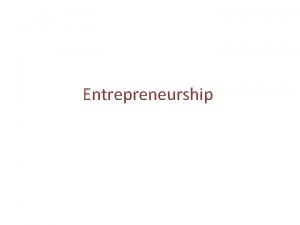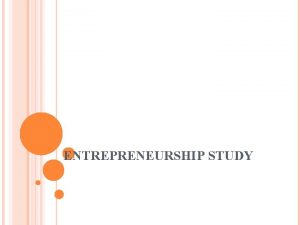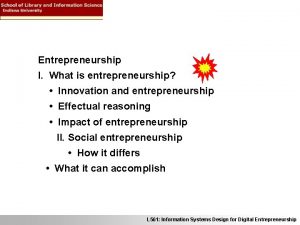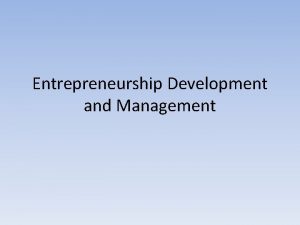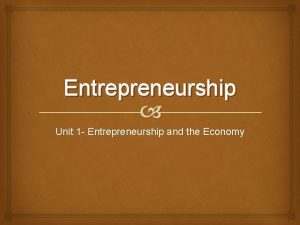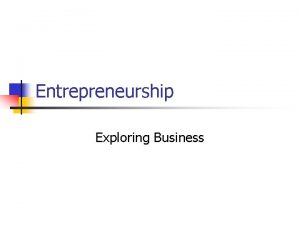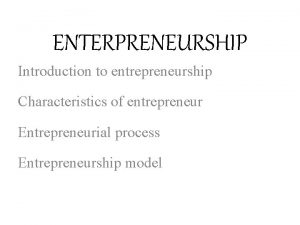Entrepreneurship An Introduction What is an Entrepreneur Entrepreneur






















- Slides: 22

Entrepreneurship An Introduction

What is an Entrepreneur? �Entrepreneur: A person who organizes and manages an enterprise, especially a business, usually with considerable initiative and risk. �Initiative: Readiness and ability in initiating action. �Risk: The hazard or chance of loss.

What is an Entrepreneur? � “An entrepreneur is someone who perceives an opportunity and creates an organization to pursue it. “ Source: The Portable MBA in Entrepreneurship, 2 nd Ed. ; William D. Bygrave, Editor. John Wiley and Sons Publishers, 1997.

Who is an Entrepreneur? �In the U. S. , approximately 4% of the adult population is actively involved in starting a business at any given time. �One (1) out of every two (2) adults has tried to start a business at some time in his or her life. Source: Entrepreneurship 3 rd Ed. , Lambing and Kuehl; Prentice Hall; Pg 25

What Does it Take to Be Successful? � “In entrepreneurship, luck is where preparation and opportunity meet. ” Source: The Portable MBA in Entrepreneurship, 2 nd Ed. ; William D. Bygrave, Editor. John Wiley and Sons Publishers, 1997.

What Does It Take to Be Successful? �“The idea is not what is important. �In entrepreneurship; ideas are a dime a dozen. �Developing the idea, implementing it, and building a successful business are the important things. ” Source: The Portable MBA in Entrepreneurship, 2 nd Ed. ; William D. Bygrave, Editor. John Wiley and Sons Publishers, 1997.

What Does It Take to Be Successful? �“Would-be entrepreneurs who are unable to name customers are not ready to start a business. �They have only found an idea and have not yet identified a market need. ” Source: The Portable MBA in Entrepreneurship, 2 nd Ed. ; William D. Bygrave, Editor. John Wiley and Sons Publishers, 1997.

Where Do You Start? �Think about WHO is going to want your product/service, what they will PAY for it, what will you NEED to carry it off, and how will you MAKE MONEY someday? That is, make a PLAN !!! �Success depends on: �positive cash flow, growth, �value creation.

The Importance of Value Creation �A successful business is one that delivers value to its customers and creates value for its owners.

The Importance of Value Creation �Value is delivered to your customers when you do something for them �Better �Cheaper �Faster �Cooler �Different �However, it is likely that none of these will work for long, so continuous improvement and innovation are essential.

The Importance of Value Creation �Value is created for the owners when: �You do more with their money than they could do with it themselves �You invest in productive activities that earn rates of return greater than their risk-adjusted costs of capital. �The present value of future cash flows exceeds the startup costs.

The Importance of Value Creation �Value is created by: �Exploiting proprietary physical resources �Possessing proprietary knowledge or expertise �Creating a new or improved product, process, or service �Staying ahead of the competition through constant improvement and innovation

Revenue Models �Revenue comes from: �Selling or licensing a product �Selling or licensing a service �Creating a transaction pipeline �Trading products or services �Selling advertising �Investing

Planning for Success �Don’t plan a business for today – Plan it for at least a year from now. �Moore’s Law: Computing power will roughly double every 18 months. �Bandwidth will continue to increase for most users almost ad infinitum. �People will live longer and maintain active lifestyles far after retirement. �Energy sources and consumption patterns will change drastically. �The world will continue to be a very dangerous place.

Planning for Success �Think about the next paradigm shift that will change business and life: �Fire �Agriculture �Horsepower �Writing �Masonry �Sail power �Metallurgy �Waterpower �Steam �Nuclear �Internet �Wireless

How To Not Get Funded �Have a half-baked idea �Have a meatless business plan �Can’t articulate your value proposition �Can’t identify your market potential �Can’t justify your sales projections �Can’t show your investors an exit �Can’t show your investors a reasonable expectation of a reasonable return on investment �Don’t think about risk �Take no risk yourself �Don’t take time to do your homework �Try to fund a “lifestyle” venture

A Lifestyle Venture � 5 -year revenue projections under $5 million �Started by people with life-style motives (live your hobby) � 90% of all startups �Zero interest to venture capitalists

Funding Your Venture �The hardest funding to raise is the first funding. You are probably on your own. �Later funding gets progressively easier depending on the results you can show to investors and what you need to fund. �BANKS are probably not going to help. �The best funding is INTERNAL funding (reinvested earnings). �PRIVATE EQUITY is the current buzzword for the major capital source for business ventures.

Private Equity Firms �As of October, 436 new private equity funds had raised a record $300 billion in 2006, providing a huge pool of funds to be invested. (Business. Week, Oct. 15, 2006) �These firms are generally very HANDS ON with you and your company.

Closing Thoughts �“I find that the harder I work, the more luck I seem to have. ” Thomas Jefferson

Closing Thoughts �“Whether you think you can, or that you can’t, you are usually right. ” Henry Ford

Closing Thoughts �“I have not failed. I have just found 10, 000 ways that won’t work. ” Thomas Edison
 Entrepreneurship module 1 introduction to entrepreneurship
Entrepreneurship module 1 introduction to entrepreneurship Women entrepreneurship introduction
Women entrepreneurship introduction Introduction of an entrepreneur
Introduction of an entrepreneur Disadvantages of entrepreneurship
Disadvantages of entrepreneurship Theory of recovery the withdrawal of status
Theory of recovery the withdrawal of status Persona in entrepreneurship
Persona in entrepreneurship Nature and importance of entrepreneurship
Nature and importance of entrepreneurship Transformation in the creative process
Transformation in the creative process Advantages of entrepreneurship
Advantages of entrepreneurship Stockholm school of entrepreneurship
Stockholm school of entrepreneurship Igniting entrepreneurship in youth
Igniting entrepreneurship in youth Soft skills entrepreneurship
Soft skills entrepreneurship Small business as a seedbed of entrepreneurship ppt
Small business as a seedbed of entrepreneurship ppt Entrepreneurship and small business management
Entrepreneurship and small business management Game tobacco
Game tobacco Scamper meaning in entrepreneurship
Scamper meaning in entrepreneurship Difference between entrepreneurship and intrapreneurship
Difference between entrepreneurship and intrapreneurship Entrepreneurship artinya
Entrepreneurship artinya Secara harfiah, kewirausahaan berasal dari kata
Secara harfiah, kewirausahaan berasal dari kata Edi entrepreneurship
Edi entrepreneurship Motivation and entrepreneurship development
Motivation and entrepreneurship development Objectives of macro enterprises
Objectives of macro enterprises Industrial units meaning
Industrial units meaning
